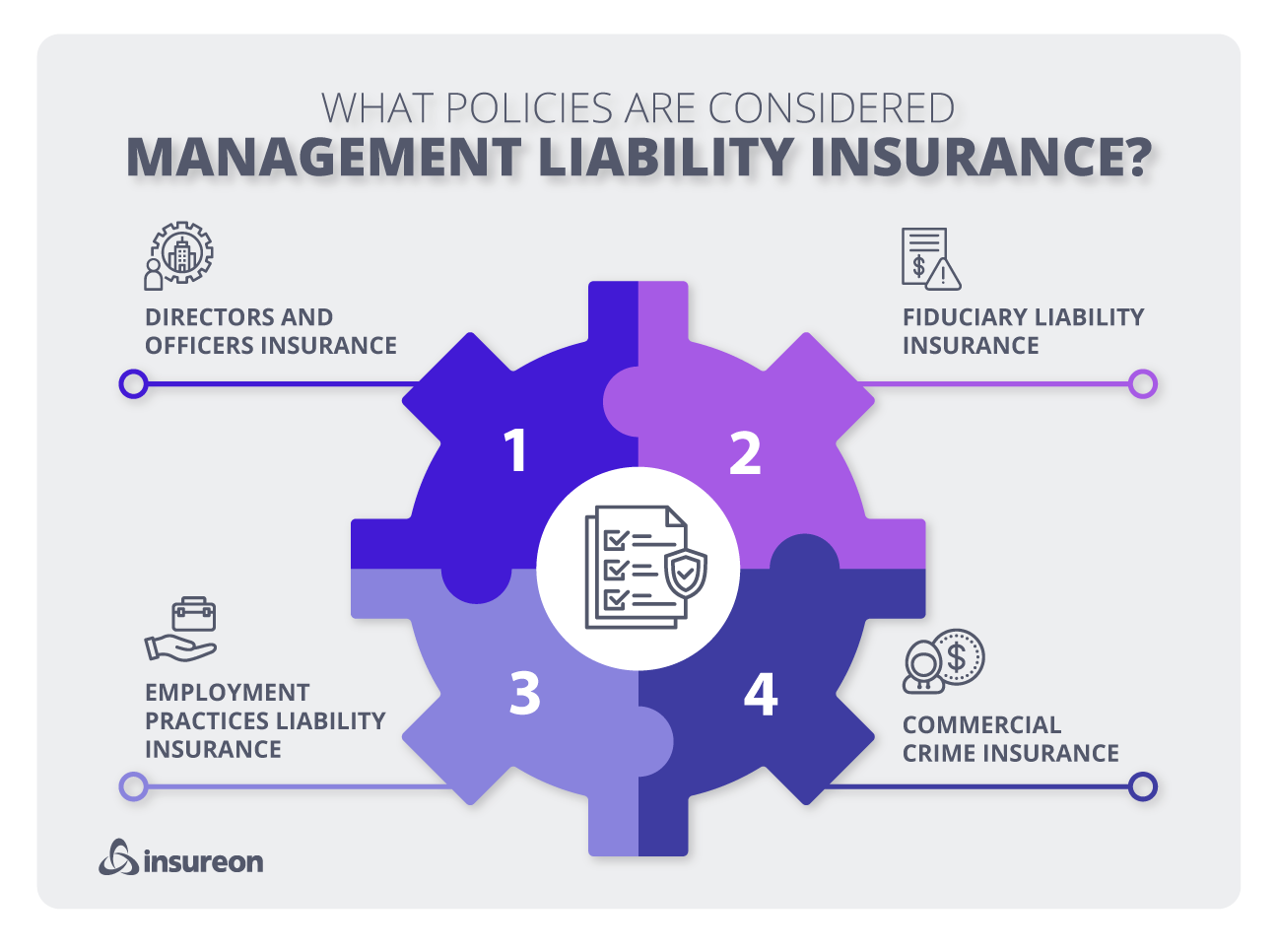
Directors and officers insurance
Directors and officers insurance
Directors and officers insurance protects board members and officers against legal expenses if they are sued for a decision they made on behalf of the company that led to a financial loss.
Why is directors and officers insurance important for small businesses?
Any company or nonprofit organization that has a board of directors should consider directors and officers insurance (D&O), a type of management liability insurance.
D&O insurance provides reimbursement for legal costs (indemnification) for a company's officers and board members in the event of a lawsuit related to the decisions they make. If they're sued while serving on your board, they could have to pay thousands of dollars in legal defense costs.
Securing this insurance policy protects your company's directors and the officers they elect or appoint. It also helps your small business attract and retain top talent, since they know their personal assets will be protected from the risks of corporate governance. In fact, most board members will expect your business to carry this insurance.

- Mismanaged funds
- Employee grievances
- Slander, libel, and copyright infringement claims
- Failure to follow organizational bylaws
- Failure to comply with regulations
What does directors and officers insurance cover?
Your directors and officers take on responsibilities and risks on behalf of your company. If someone sues them for a decision they made that caused a financial loss or other grievance, your D&O insurance can protect them.
You might see these issues referred to as a breach of fiduciary duty, which means the person has failed to act in the best interest of your company.
It’s worth noting that D&O insurance is a claims-made policy, which means your policy would have to be in effect when a claim is made, otherwise the insurance company won’t cover it.
Specifically, your D&O insurance policy provides coverage for:
Mismanaged funds
If a board member is sued for mismanaging funds or making poor investments, directors and officers insurance can help pay for legal fees.
Employee lawsuits
Workers can sue board members for a variety of reasons, including discrimination, invasion of privacy, and even emotional distress if they're not satisfied with leadership. D&O insurance helps board members with lawsuit costs and protects their personal finances.
Libel and other advertising injuries
A competitor may accuse a company's board members of defamation or theft of intellectual property, which could result in a lawsuit covered by D&O insurance.
Failure to follow organizational bylaws
If board members or executives violate one of the organization’s bylaws, they could be sued by shareholders or employees.
Failure to comply with regulations
A company's board of directors can be held liable if the organization fails to comply with industry standards or regulations. D&O insurance offers protection against such lawsuits.
How much does D&O insurance cost?

Insureon's small business customers pay an average premium of $138 per month for D&O insurance.
Factors that affect the cost of directors and officers insurance include:
- Number of directors on the board
- Number of employees
- Geographic footprint
- Company finances
- Potential for initial public offering
- D&O risk profile
- Policy limits and deductible amount
- History of insurance claims
Verified business insurance reviews
Hear from customers like you who purchased small business insurance.
How do I get directors and officers insurance coverage?
We're on top of your small and medium-sized business insurance needs. We'll help you find policies that protect what you've worked so hard to build.
Start here. Tell us about yourself. Questions? We've got your back. The info you share is secure. We'll double-check it and a pro with experience in your field will be in touch.
Fast? You can compare quotes from leading insurance providers in seconds and get a certificate of insurance the same day.
Always online, always on your side. Helping protect your business.
It's easy to buy directors and officers insurance with Insureon. Fill out our free online application to get quotes from top-rated providers on all types of business insurance.
When you purchase a policy, you’ll get a certificate of liability insurance as proof of insurance for the policyholder. For any other questions about coverage, you can also contact an Insureon agent.
Who needs directors and officers insurance coverage?
D&O liability insurance is beneficial for any business that has a board of directors, including startups.
It protects your board members and officers from claims of wrongful acts or misrepresentation in the decisions they make for your company. It also helps attract top talent to your board who may look for this coverage before accepting a position.
The following industries often rely on this coverage as part of their risk management strategy:
Nonprofits
Every nonprofit corporation must have a board of directors, and D&O insurance protects them in the event of a lawsuit related to their decisions.
For example, board members decide to remove the female CEO of a charitable organization who has helped double the business’s revenue during her tenure. She takes legal action and sues the company’s board for gender discrimination.
A D&O policy would cover the board's legal costs and any resulting judgment or settlement. It's for this reason why coverage is such an integral part of a nonprofit's and charitable organization's risk management plan.
IT and technology
Tech companies with a board of directors should consider D&O insurance to protect their members and officers, and to attract individuals with expertise. It can cover costs related to violations of bylaws, among other risks.
For example, a board member at a large public mobile app business violates the non-compete clause in the company’s bylaws by acting as a consultant to a competitor. The board member’s advice enables the competitor to launch a new iPhone app and triple its market share, causing the public company’s stock price to drop significantly.
Shareholders lose millions of dollars and file a lawsuit against the company’s board, which is covered by D&O insurance.
Consulting
Directors and officers liability insurance provides important protection for consulting businesses, who may rely on their boards to make important decisions about acquisitions and other major moves.
For example, a marketing consulting firm acquires a smaller competitor and eventually loses millions of dollars because of the deal. It is later revealed that the board members who approved the transaction did not request important financial information on the acquired company, an oversight that results in a lawsuit.
Real estate
Real estate boards of directors also benefit from the protection afforded by a D&O policy.
For example, several influential board members at a real estate brokerage suggest a print ad campaign featuring misleading market share statistics about a competitor and are later sued for libel.
Healthcare
The added liability of HIPAA makes D&O insurance a must-have for healthcare facilities whose board of directors helps make important business decisions.
For example, a data breach at a medical office exposes thousands of patients’ confidential information. It's later discovered that the organization was not in full compliance with the HIPAA security rule, and patients sue the board for negligence.
What does directors and officers insurance not cover?
While directors and officers insurance covers many different types of legal issues, its protection does not extend beyond decisions made by your directors and officers.
To protect against other risk exposures, such as bodily injuries, property damage, and other losses, you'll want to invest in other types of coverage.
Examples of exclusions from D&O coverage include:
Intentional wrongdoing
Directors and officers insurance is unlikely to cover financial losses or lawsuits resulting from premeditated criminal acts by board members or executives.
Fidelity bonds (a type of commercial crime coverage) can provide reimbursement for embezzlement and fraud committed against a client or your business.
Board member injuries
If a board member at your nonprofit hurts their back when lifting boxes for a holiday food drive, D&O won’t cover their medical treatments or lost wages while they recover.
Workers' compensation insurance is the insurance solution you'll need to protect your organization from on-the-job injuries and related lawsuits. It is required in almost every state for businesses with employees.
Client injuries or property damage
If a client trips at your business and breaks their wrist, your D&O policy won't cover their medical expenses. It also won't cover damage done to a client's property, such as an employee who accidentally drops and breaks a client's smartphone.
General liability insurance helps covers lawsuits and related expenses due to third-party bodily injuries and property damage. Many landlords require this policy for businesses that rent a commercial space.
Professional mistakes or oversights
Directors and officers insurance does not protect your business against lawsuits over professional mistakes and oversights beyond those made by board members.
Professional liability insurance, also called errors and omissions insurance (E&O), helps pay expenses related to missed deadlines, negligence, breach of contract, and other mistakes made by your business.
General liability insurance
Business owner’s policy
Workers’ compensation insurance
Professional liability insurance
Employment practices liability insurance

FAQs about directors and officers insurance
Review answers for frequently asked questions about D&O coverage and other types of small business insurance.
How does D&O insurance work?
Your board members and officers face many of the same risks as your business: lawsuits over hiring decisions, trademark issues, and mismanagement of funds. Unlike your business, they are not protected by general liability or professional liability policies.
If they're sued, D&O insurance can help pay the cost of hiring an attorney, judgments, settlements, and other expenses related to the lawsuit.
For example, suppose a board member makes a poor investment decision with business funds that costs the company tons of money. As a result, employees do not get their annual bonuses, and a couple of high-ranking employees decide to sue claiming injury.
Once the suit is filed, the insurer is then notified. Since mismanagement of funds is a covered claim, the insurer will then pay for the board member's defense costs. And if the case is lost, they will also pay for the loss.
What is Side A, Side B, and Side C in D&O insurance?
A D&O insurance policy consists of three main agreements between the policyholder and the insurer:
- Side A: Side A coverage protects individual directors and officers who would otherwise have personal liability in the event of a lawsuit. It pays them back for their out-of-pocket expenses.
- Side B: When a business indemnifies its directors and officers, the business agrees to pay their legal costs and receive reimbursement from the insurer.
- Side C: Side C coverage is also called entity coverage. It covers securities claims only for publicly traded companies, with broader coverage for private companies and not-for-profit companies.
Check with an agent to make sure you get the right coverage for your business.
Can I bundle D&O coverage with EPLI insurance?
Small business owners often choose to bundle D&O liability coverage with employment practices liability insurance (EPLI), another type of management liability insurance.
EPLI can cover your legal costs if an employee sues your business over unfair hiring practices or another violation of employee rights. A management liability insurance bundle usually costs less than purchasing the policies separately.
Is directors and officers the same as management liability insurance?
D&O insurance is a type of management liability insurance and can often be bundled with similar coverages. These policies protect the decision-makers at your business and can help attract top talent to your company, as they may look for this protection in place.
Keep in mind that D&O only covers risks related to decisions made by your board members and officers. You'll want to consider other types of management liability insurance to protect your managers and other employees at your business.

Is directors and officers insurance the same as professional liability insurance?
Professional liability insurance protects individuals who provide professional services against the cost of client lawsuits over unsatisfactory work.
While directors and officers insurance also provides coverage for legal costs, it is specifically designed for lawsuits against board members and officers of a company over the decisions they make, which applies more to how those decisions impacted the company they work for as opposed to services promised to a client.



























